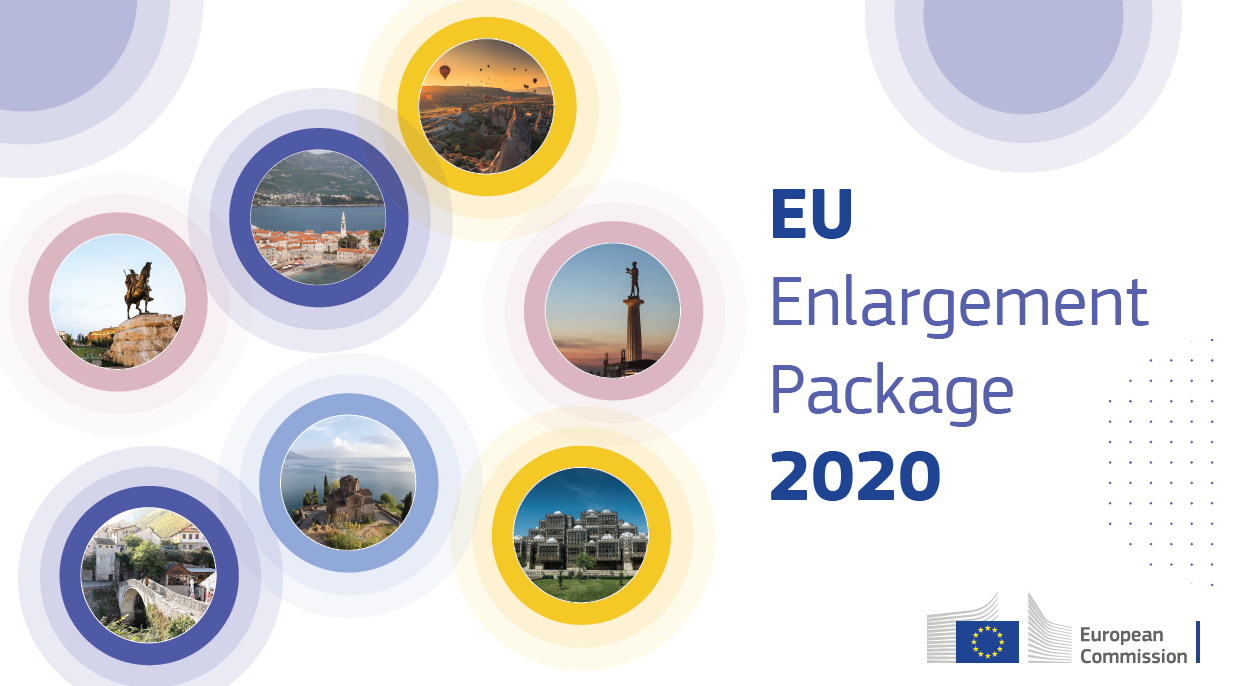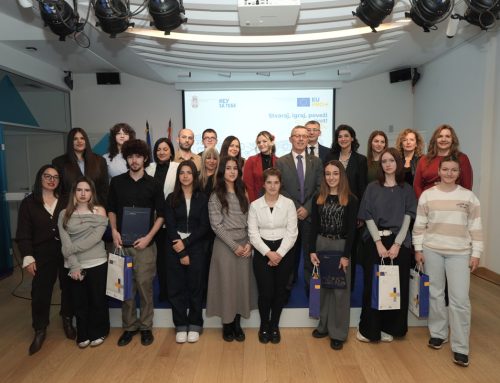Today, the Commission adopted its Communication on EU enlargement policy and the 2020 Enlargement Package: The annual reports, assessing the implementation of fundamental reforms in the Western Balkans and Turkey, are presented together with clearer and more precise recommendations and guidance on the next steps for those partners, in line with the enhanced enlargement methodology.
EU High Representative for Foreign Affairs and Security Policy/Vice-President of the European Commission, Josep Borrell, said: “The citizens of the Western Balkans are part of Europe and they belong in the European Union. Today’s reports on the Enlargement Package provides a rigorous assessment that indicates the way forward, highlighting what has been achieved and where there is still hard work to be done.“
Presenting the annual Enlargement Package, EU Commissioner for Neighbourhood and Enlargement, Olivér Várhelyi, commented: “From the start of the mandate of this Commission, my aim has been to make sure both our partners in the Western Balkans and our Member States regain trust in the accession process. Our rigorous but fair assessments presented today detail where the countries stand with the reforms, with clearer guidance and recommendations on the future steps. Their dynamic implementation will speed up their progress on EU path and bring long-lasting results. In parallel, we have presented an Economic and Investment plan to spur their long term recovery and accelerate their economic convergence with the EU.”
Western Balkans
A credible enlargement policy is a geostrategic investment in peace, security and economic growth in the whole of Europe, more so in times of increasing global challenges and divisions. The firm and merit-based prospect of full EU membership for the Western Balkans is in the European Union’s very own political, security and economic interest. The Commission’s Communication “Enhancing the accession process – A credible EU perspective for the Western Balkans”, endorsed by Member States in March 2020, set out concrete proposals for strengthening the accession process, by making it more predictable, more credible, more dynamic and subject to stronger political steering. The strengthened approach underlines the importance of a merit-based accession process built on trust, mutual confidence and clear commitments by the European Union and the Western Balkans, with an even stronger focus on fundamental reforms.
Credible progress in the rule of law area remains a significant challenge, which often correlates with a lack of political will. A slow pace in judicial culture continues throughout the Western Balkans region without sufficient commitment to the principle of judicial independence. The overall pace in the fight against corruption has slowed down and the track record in most partners is far from meeting the requirements for membership, whilst in the area of freedom of expression and media pluralism there has been the least progress last year.
For the first time, the Commission assesses the overall balance in the accession negotiations with both Montenegro and Serbia and proposes the way ahead. This should allow the intergovernmental conferences, which should take place after the publication of the Commission’s annual package, to provide the fora for political dialogue on reforms, take stock of the overall accession process and set out the planning for the year ahead, including the opening and closing of chapters and possible corrective measures.
In the case of Albania and North Macedonia, the Commission looks forward to the first intergovernmental conferences to be convened as soon as possible after the adoption of the negotiating frameworks by the Council. The Commission confirmed further progress in the implementation of reforms in Albania and North Macedonia. Albania has already made decisive progress and is close to meeting the conditions set by the Council in view of the first intergovernmental conference.
Bosnia and Herzegovina is expected to address 14 key priorities from the Commission’s Opinion on its EU membership application, with only some steps taken so far. As regards Kosovo*, limited progress was made on EU related reforms and it is important that Kosovo authorities redouble their efforts to advance on the European path, including through the implementation of the Stabilisation and Association Agreement.
The Commission also adopted today a comprehensive Economic and Investment Plan for the Western Balkans, which aims to spur the long-term recovery of the region, a green and digital transition, foster economic regional cooperation, boost economic growth and support reforms required to move forward on the EU path.
Turkey
Turkey remains a key partner for the European Union. However, Turkey has continued to move further away from the European Union with serious backsliding in the areas of democracy, rule of law, fundamental rights and the independence of the judiciary. As stated by the Council in 2018 and 2019, Turkey’s accession negotiations have effectively come to a standstill and no further chapters can be considered for opening or closing. The report presented today confirms that the underlying facts leading to this assessment still hold, despite the government’s repeated commitment to the objective of EU accession. Dialogue and cooperation with Turkey have continued, in particular on addressing challenges related to migration, despite concerns over the events at the Greek-Turkish border in March 2020. The reports also outlines how Turkey’s foreign policy increasingly collided with the EU priorities under the Common Foreign and Security Policy.
Next steps
It is now for the Council to consider the recommendations of the Commission and take decisions on the steps ahead.
Background
Enlargement process
The current enlargement agenda covers the partners of the Western Balkans and Turkey. Accession negotiations have been opened with Montenegro (2012), Serbia (2014), and Turkey (2005). In March 2020, Member States agreed to open accession negotiations with North Macedonia and Albania. Bosnia and Herzegovina (application to join the EU submitted in February 2016) and Kosovo (Stabilisation and Association Agreement entered into force in April 2016) are potential candidates.
The EU accession process continues to be based on established criteria, fair and rigorous conditionality, and the principle of own merits. EU accession requires the implementation of complex reforms in a challenging environment; an objective which can only be achieved in the long term. For the process to move forward, accession candidates need, as a matter of priority, to deliver more swiftly genuine and sustainable results on key issues: the rule of law, justice reform, fight against corruption and organised crime, security, fundamental rights, functioning of democratic institutions and public administration reform, as well as on economic development and competitiveness.
Further progress on reconciliation, good neighbourly relations and regional cooperation are also of key importance.
Reporting in this year’s enlargement package also reflects the proposals of the enhanced approach to the accession process. The assessments and recommendations for the partners, especially the forward-looking guidance on specific reform priorities, are even clearer and more precise. The reports provide greater transparency, including on the state of play of the accession negotiations and the extent to which fundamental reforms are being implemented. Comparative overviews of performance on the fundamentals are provided, as well as external indices to complement the Commission’s assessments. Stronger contributions were solicited from Member States, who were consulted during the process and provided input and expertise, including through their Embassies on the ground. The reports also include assessments of the public political commitment of authorities to the strategic goal of EU accession.
For More Information
For detailed findings and recommendations on each partner, see:
Albania: MEMO; Report; factograph
Bosnia and Herzegovina: MEMO; Report; factograph
Kosovo: MEMO; Report; factograph
Montenegro: MEMO; Report; factograph
North Macedonia: MEMO; Report; factograph
Serbia: MEMO; Report; factograph
Turkey: MEMO; Report; factograph
For more general information
European Commission’s February 2020 communication on “Enhancing the accession process – A credible EU perspective for the Western Balkans”
Factsheet – The EU accession process of the Western Balkans
Factsheet – EU Engagement in the Western Balkans
*This designation is without prejudice to positions on status, and is in line with UNSCR 1244/1999 and the ICJ Opinion on the Kosovo declaration of independence.




